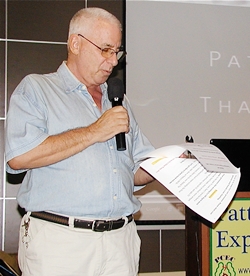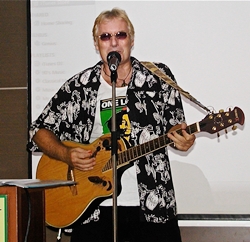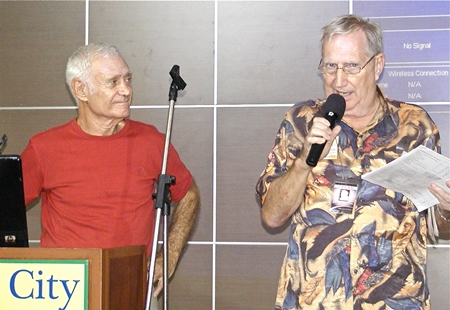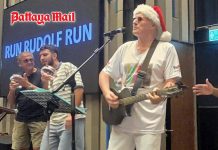Oh my aching back! If you are experiencing back pain, it might mean you have a herniated (slipped) disc. This was explained to the Pattaya City Expats Club on Sunday, November 20, at the Amari’s Tavern by the Sea Restaurant.
After the preliminary announcements including the availability of nurses to give free blood pressure and body mass index readings, Master of Ceremonies Richard Silverberg called on fellow member Gavin Waddell, international marketing executive for Phyathai Sriracha Hospital to introduce the guest speaker, Dr. Ekkawit Thawon M.D. He noted that Dr. Ekkawit is an orthopedic surgeon who specializes in back surgery and that he would be talking about the causes, diagnosis, and treatment of a herniated disc.
 Dr. Ekkawit Thawon M.D., an Orthopedic Surgeon for Phyathai Sriracha Hospital, specializing in back surgery, talks to PCEC members and guests about the causes, diagnosis, and treatment of a herniated disc. Member Gavin Waddell, also International Marketing Executive for Phyathai Sriracha Hospital, looks on.
Dr. Ekkawit Thawon M.D., an Orthopedic Surgeon for Phyathai Sriracha Hospital, specializing in back surgery, talks to PCEC members and guests about the causes, diagnosis, and treatment of a herniated disc. Member Gavin Waddell, also International Marketing Executive for Phyathai Sriracha Hospital, looks on.
Gavin gave a brief history of orthopedic treatment from its beginning. He mentioned that the most dramatic advances in treatment have generally come about during wartime because of the large number of injured. He also pointed out that Orthopedic Surgeons not only need to understand the skeletal system, but also know about many other internal organs as they can be interrelated with skeletal problems.
 Member Roy Albiston conducts the Open Forum, where you can get answers to most questions that arise living and loving in the Land of Smiles.
Member Roy Albiston conducts the Open Forum, where you can get answers to most questions that arise living and loving in the Land of Smiles.
Dr. Ekkawit began by showing diagrams of the spine. He pointed out that the bones that form the spine are cushioned by small, spongy discs. When these discs are healthy they act as shock absorbers for the spine and keep the spine flexible. However, when a disc is damaged, it can bulge or break open. When that happens, it is called a slipped disc and it can be extremely painful. The spine also has a large number of nerves associated with it and it is the pinching of these nerves by the slipped disc that is the primary cause of pain. He explained that a herniated disk can be the result of trauma or degeneration due to aging. Most often, a herniated disk will occur in the lower back lumbar region.
It is possible to have a herniated disc with no symptoms. In such cases, treatment is not necessary. But, in many cases, there are symptoms which can be pain, weakness, numbness, and bladder/bowel dysfunction. However, since there can be other causes for these symptoms, having them does not automatically mean that you have a herniated disc. So when these symptoms appear, the next step is to diagnose the reason. The tools used are blood tests, x-rays, and MRI or CT scans. Dr. Ekkawit noted that an X-ray will not disclose a herniated disc, but is used to rule out other causes.
 PCEC Board member and Frugal Freddy coordinator, ‘Hawaii Bob’ Sutterfield, updates members on recent & future activities of Frugal Freddy, dining at some of Pattaya better quality but ‘cost effective’ restaurants.
PCEC Board member and Frugal Freddy coordinator, ‘Hawaii Bob’ Sutterfield, updates members on recent & future activities of Frugal Freddy, dining at some of Pattaya better quality but ‘cost effective’ restaurants.
He pointed out that in about 90 percent of cases, treatment does not require surgery. Depending on the severity of symptoms, treatments for a herniated disc can include physical therapy, muscle relaxant medications, pain medications, anti-inflammation medications, and local injections of medicine direct into the spine. For all cases, the person should rest and avoid reinjuring the disc. Early on, even people with relatively severe pain can respond to conservative measures without the need for surgical procedures. Surgery is used only in severe cases, especially if bladder/bowel dysfunction is involved. The type of surgery will depend on each individual case; the primary objective being to remove the fragment of spinal disc that is causing the pressure on the nerve.
After Dr. Ekkawit answered several questions from the audience, Master of Ceremonies Richard Silverberg called on Roy Albiston to bring everyone up to date on upcoming events and to conduct the Open Forum where questions are asked and answered about living in Thailand and Pattaya in particular.




